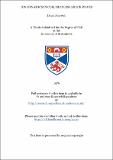Ion dynamics in collisionless shock waves
Abstract
In a laminar model of a collisionless magnetosonic shock wave, ion equations of motion are integrated through shock-like profiles. Conservation relations and Maxwell's equations allow a self-consistent determination of unknown downstream ion distribution functions fᵢ, ion temperature Tᵢ, and electric potential jump 𝛷. Favourable comparison of model Tᵢ, 𝛷.
Favourable comparison of model Tᵢ, 𝛷 , with experiment establishes (at low 𝛽 ≲ O.3, 𝛽=8 π N
[sub] l k (T[sub]e₂+Tᵢ[sub]l)/B₁²)
importance of laminar ion dynamics. Heating is due to distortion of Maxwellian distributions when entropy is conserved; in particular shock dynamics is dominated by a fast "tail" of reflected ions. The solutions for fᵢ are considered. The "stability" of the model to its assumptions (linear profiles, shock thickness (L[sub]s)) is shown. When reflections occur a self-consistent length emerges. The solutions Tᵢ, 𝛷 are extensively studied at various Mach numbers for different values of 𝛽. Laminar ion heating is very efficient and at high 𝛽 can exceed proper conservation levels due to ion reflections; at high 𝛽(≥ 𝛽 *) the electric potential is unable to slow the ions to conservation levels. The model predicts significant reflected ion currents in the plane of the shock. The boundary 𝛽 * is determined. Then laminar ion dynamics on the scale of the electron heating length (~10 C/w[sub]p ₑ) cannot occur for 𝛽 > 𝛽 *. Dependence on L[sub]s and T ₑ₁,/Tᵢ₁ is considered. The nature of non-laminar 𝛽 >𝛽* shocks is considered. Collisions are found to be important in laboratory shocks, and are efficient in slowing the reflected ions. In the absence of collisions, ion instabilities must be considered. It is shown that turbulent slowing of the fast ions cannot take place in L[sub]s alone. Further it is shown possible to construct a shock so that non-laminar mechanisms cannot occur significantly. Then the laminar model is re-instated. A decoupling of ion and electron heating lengths is proposed. Reflection heating in the Earth's Bow Shock (𝛽>𝛽*) is modelled, and is comparable with experiment.
Type
Thesis, PhD Doctor of Philosophy
Collections
Items in the St Andrews Research Repository are protected by copyright, with all rights reserved, unless otherwise indicated.

